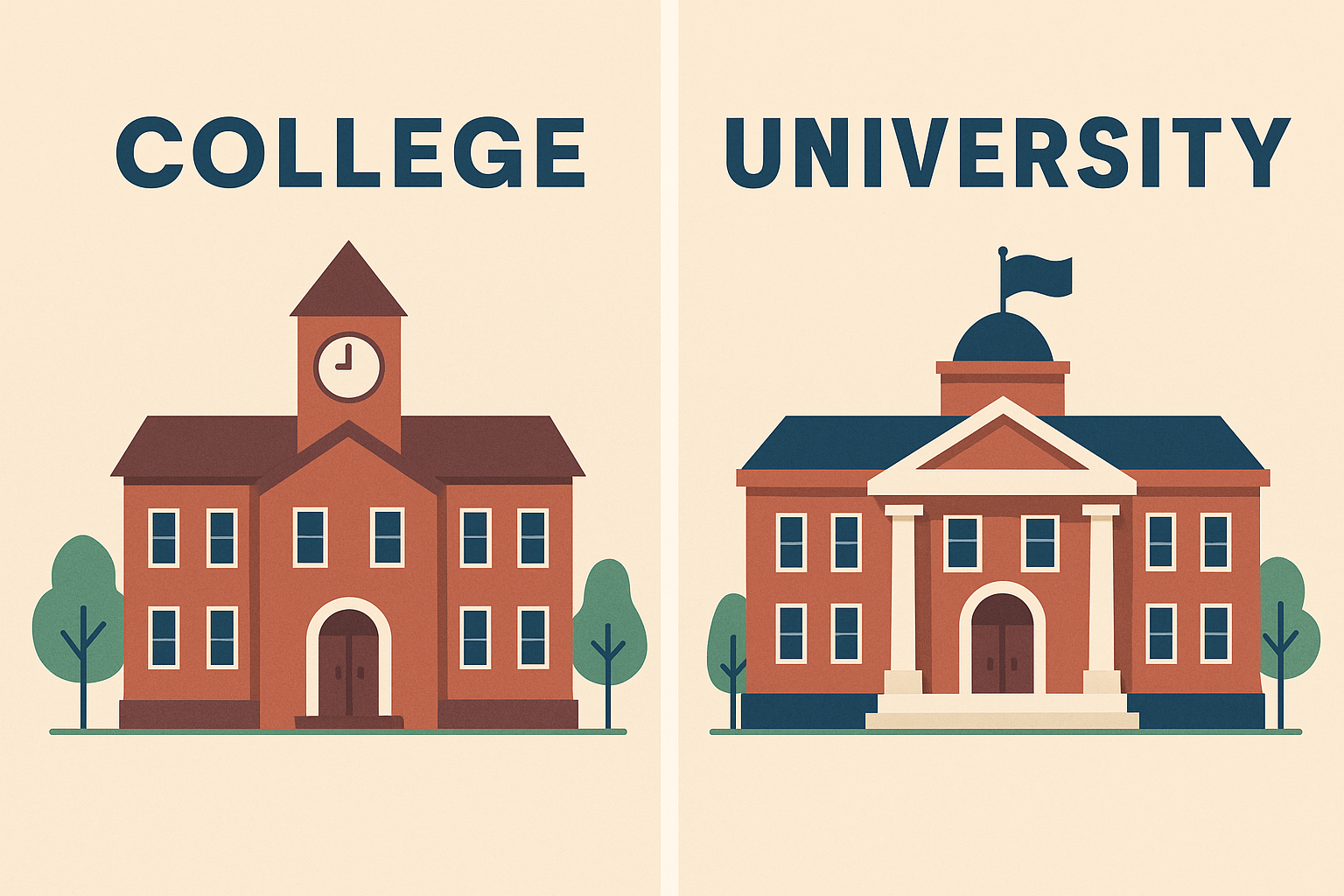What Is the Difference Between a College and a University?

Choosing the right higher education path can feel like standing at a crossroads with signs pointing in two directions: “College” and “University.” The terms often get used interchangeably, but they aren’t exactly the same. Understanding these differences — especially in the U.S. — can help you make a more confident choice about where to spend the next few years growing academically, personally, and spiritually.
Before we break it down, here’s the short version:
Key Takeaways
- Colleges typically focus on undergraduate degrees and may have smaller campuses and class sizes.
- Universities usually offer both undergraduate and graduate degrees, along with a wider range of programs and research opportunities.
- Campus culture, extracurricular activities, and learning environments can differ greatly between the two.
- Faith-based institutions — whether referred to as a college or a university — integrate Christian values into their academic programs and student life.
- Your best fit depends on many factors, but the most important is your future ambitions.
Defining “College” and “University” in the U.S.
In the United States, the words “college” and “university” often mean similar things, which can confuse students, parents, and even international applicants.
- College: Typically refers to a smaller institution that focuses primarily on undergraduate degree programs. Many colleges are liberal arts colleges, emphasizing a broad-based education that develops critical thinking, communication, and problem-solving skills alongside your chosen field of study.
- University: Usually a larger institution that offers undergraduate and graduate programs. Universities often have multiple “colleges” within them — such as a College of Business or College of Education — and may be known for research facilities, advanced laboratories, and extensive extracurricular options.
The difference is less about prestige and more about the scope of programs offered and the scale of the learning environment.
Degree Programs: Undergraduate vs. Graduate
One of the clearest distinctions lies in the degrees available:
- Undergraduate degrees (Associate’s or Bachelor’s) are the foundation for most careers. Colleges generally focus here, offering a wide range of fields of study to prepare you for entry-level careers or graduate school.
- Graduate degrees (Master’s, Doctoral, and Professional) are often only available at universities that have the resources to support advanced study and specialized research.
Faith-based institutions across North America reflect this variety. Some Christian colleges concentrate solely on undergraduate programs that integrate biblical perspectives across disciplines. Others, like larger Christian universities, also offer graduate programs in ministry, counseling, business, or education.
Campus Size and Learning Environment

- Colleges often have smaller student populations, which can lead to smaller class sizes and closer relationships with professors. You’re more likely to see familiar faces on the quad, and it’s easier to get involved in multiple activities.
- Universities tend to have larger campuses with thousands of students. This scale can bring more facilities, specialized faculty, and diverse student organizations, but it may also mean larger lecture halls for introductory courses.
If you’re seeking a close-knit community, many colleges provide that environment while still offering robust academic programs.
Types of Institutions to Know
The U.S. higher education landscape includes more than just the college/university divide:
- Liberal Arts Colleges – Small, undergraduate-focused institutions with an emphasis on a well-rounded education.
- Large Universities – Multi-college systems offering undergraduate and graduate programs, plus research opportunities.
- Community Colleges – Two-year institutions granting associate degrees and certificates, often serving as a stepping stone to a four-year institution.
- Trade Schools – Focused on practical skills for specific careers, such as welding, cosmetology, or medical technology.
Many students start at a community college and then transfer to a four-year college or university to complete a bachelor’s degree.
Extracurricular Activities and Research Opportunities
While both colleges and universities offer activities beyond the classroom, universities often have broader resources:
- Large-scale athletics programs
- Extensive research labs and faculty-led projects
- Graduate-level seminars and conferences
- Diverse clubs and cultural organizations
Colleges, though typically smaller, may provide more accessible leadership opportunities since competition for spots in student government, choirs, athletic teams, or mission trips can be less intense.
Ultimately, whether you prefer a wide variety of options or a close-knit community with hands-on involvement, understanding these differences can help you find the best environment for your personal and academic growth.
How Transfer Paths Work
Starting small doesn’t mean staying small. Community colleges provide a path to affordable education and a smoother transition into a bachelor’s program. Many Christian institutions welcome transfer students and help ensure credits align with your intended major.
When considering a transfer, pay attention to:
- Transfer credit policies
- Required courses for your major
- Whether the institution offers your intended program of study
- Opportunities to get involved quickly in campus life
Faith-Based Colleges and Universities: A Distinctive Choice
For students seeking a higher education experience rooted in Christian values, the “college” vs. “university” label matters less than the mission and community of the institution.
Find Your Christian College partners with schools that:
- Integrate faith into academics and campus life
- Maintain Christian hiring practices and uphold biblical principles
Whether you feel called to attend a small Christian college or a large Christian university, the goal is the same: to prepare you academically and spiritually for your future calling.
If you’re ready to explore schools that align with your faith and goals, download THE Guide — your key to discovering nearly 100 Christian colleges and universities across North America.
Questions to Ask Yourself Before Deciding
- Do I want a smaller, more personal learning environment or a larger campus with more program variety?
- How important is a faith-integrated education to me?
- What extracurriculars matter most? Athletics, arts, ministry, research?
Common Questions About College and University

What is the difference between a college and a university?
In the U.S., colleges usually focus on undergraduate degrees with smaller campuses, while universities offer both undergraduate and graduate programs, often with larger facilities and more research opportunities.
Do universities offer graduate programs?
Yes. Universities typically provide master’s and doctoral degrees in addition to undergraduate programs.
Can community college credits transfer to a four-year institution?
Often, yes. Many students transfer to a four-year college or university after completing general education requirements at a community college.
Are Christian colleges only for ministry majors?
No. Christian colleges offer a wide range of majors, from business and nursing to education and engineering.
Is a liberal arts college the same as a university?
Not exactly. Liberal arts colleges focus on undergraduate education and offer smaller, discussion-based classes, while universities have broader degree offerings and research opportunities.
Final Thoughts
No matter what type of school you’re considering—college, university, community college, or trade school—the key is finding a place where you can grow academically, personally, and spiritually.
Take the time to consider what matters most to you — your learning environment, program offerings, extracurricular passions, and faith integration. And remember, your future ambitions are what truly define the right choice.
Ready to start exploring? Download THE Guide and discover nearly 100 Christian colleges and universities across North America that support both your academic and spiritual growth.







